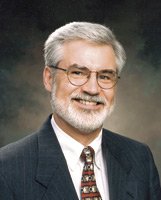I recently visited a National Park Service site that I hadn't seen in more than 35 years. It is an eastern Tennessee valley that tourists drive through in the Great Smoky Mountains today. It is called Cade's Cove.

Bill Webb
|
Along with periodic visitor centers stocked with postcards, caps, T-shirts, bathrooms, toys and trinkets, the driving tour is dotted with parking lots at long-vacant cabins, churches and farm buildings, walking trails and natural mountain wonders like waterfalls.
At one such stop a park ranger explains to a family that he is not on duty to protect visitors from bears but to protect the wildlife from the people who stream through the park.
As it was three-plus decades ago, the drive is pleasant, and the scenery spectacularly beautiful. You don't have to go far before you see and hear water rippling down mountain streams or over waterfalls. It is relaxing.
To me, the tour seemed almost exactly like it was on my earlier visit. But there was one notable difference. When the area was originally designated as a National Park site, officials made a deal with current residents. They would not be forced to vacate their property as long as they lived. So on my earlier visit, Cade's Cove still had a number of living residents.
The last one apparently passed away a few years ago. He apparently had willed his estate to Tennessee Baptists' children's home ministry. Cade's Cove as a community had died and is now solely a tourist destination where people learn how life was generations and generations ago. The people who do demonstrations at one of the old flour mills are employed to come in and produce souvenir bags of ground grain. Only the history and the wildlife that has been so fiercely protected survive today.
This sweeping valley so protected by the mountains is a bit of a parable on life elsewhere. Protected as it was, it was destined to die as a community so visitors would not forget how people no longer alive once lived and made their way. Presumably, all the warning signs about harming wildlife didn't exist a long time ago. This must have been a hunter and trapper's paradise.
Most of our readers don't live in the mountains and probably most are not familiar with the hardships of clearing mountainous and forested land for farming. On the other hand, some would have personal experiences with such day-to-day challenges.
The fact is that virtually every person begins anticipating death — or the potential of death — somewhat early in life. We anticipate it, sometimes buying funeral plots and paying in advance for arrangements we hope we might not have to use for a long time.
When I was a youngster, my parents purchased a $1,000 life insurance policy with my name on it. It wasn't much, but it protected them if something were to happen to me. I still own it. Early in our work lives we become aware of Social Security retirement provisions, company pensions or various other tools to get us through life as we age. We are dying, and we learned from our parents that when the time comes, it is best not to be a burden on others, even to bury us.
It has been a long time since my Grandmother Richardson passed away and we no longer ventured out to the farm to visit her, wade in her pond, play in the barn or sleep on featherbeds in her attic. What we experienced back then is long gone. Only memories remain, and the keepers of those memories have slowly been exiting this earth via their own deaths.
Today, if you go to Cade's Cove and do more research than I did on a morning driving visit, you can learn what contributions were made by early residents. Log homes still bear the names of these settlers and residents. They are now gone, but many left a trace that their lives mattered to others. They didn't just exist. Their names live on.
I don't think people still use the church buildings in the valley these days. Each has rows of rough wooden pews and a platform. A marker in one church's cemetery indicated the grave's resident died in 2007. We know that the anti-missionary sentiment in a Primitive Baptist Church spawned a Missionary Baptist church nearby. A little later, perhaps, a Methodist congregation built a meetinghouse in the facility.
We can only wonder how significant these houses of worship must have been in the lives of Cade's Cove residents and what their reach might have been even beyond the community's borders. Researchers likely know about many of them.
Perhaps future generations will ponder the same questions about us 25 or 50 or 100 years from now. Surely on our journeys through life, each of us wants to make a difference.
Bill Webb is editor of Word&Way.
